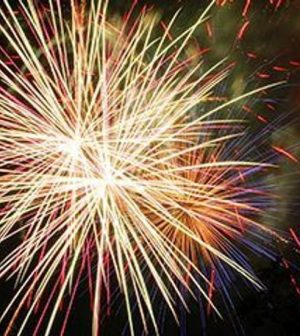- Recognizing the Signs of Hypothyroidism
- 10 Strategies to Overcome Insomnia
- Could Artificial Sweeteners Be Aging the Brain Faster?
- Techniques for Soothing Your Nervous System
- Does the Water in Your House Smell Funny? Here’s Why
- Can a Daily Dose of Apple Cider Vinegar Actually Aid Weight Loss?
- 6 Health Beverages That Can Actually Spike Your Blood Sugar
- Treatment Options for Social Anxiety Disorder
- Understanding the Connection Between Anxiety and Depression
- How Daily Prunes Can Influence Cholesterol and Inflammation
Another Fireworks Hazard: Loss of Hearing

Add hearing loss to the many dangers posed by fireworks.
More than 40 million Americans have some type of hearing loss, and about 10 million of those cases can be attributed to noise, according to the American Academy of Audiology.
Noise from fireworks can reach 155 decibels — louder than a jet plane taking off (150 decibels from 82 feet away) or a jackhammer (about 100 decibels), the academy warned.
Hearing damage can result from multiple lifetime exposures or a single loud blast. Noise over 120 decibels can cause immediate harm to hearing, according to the U.S. Centers for Disease Control and Prevention.
When it comes to fireworks, backyard fireworks pose a greater risk than professional displays, the academy said in a news release.
“Never hold a firework or firecracker, with the intention to throw it before it explodes,” said Angela Shoup, president of the audiology academy. “Even if you do throw it in time (to avoid injury to your hands and face), if it is anywhere close to you when it explodes, your hearing can be immediately and permanently damaged.”
Shoup explained that the inner ear contains delicate hair cells, which don’t grow back.
“Once these are damaged by noise, the result may be permanent hearing loss,” she said. In addition to her role with the audiology academy, Shoup is executive director of the Callier Center for Communication Disorders at the University of Texas at Dallas.
The U.S. National Institutes of Health recommends using ear plugs or other hearing protection when around fireworks or other loud noises.
“Children are at particular risk for hearing loss from ‘backyard’ fireworks displays, because of their excitement and curiosity and wishing to be close to the activity,” Shoup explained.
Signs of hearing loss may include:
- Muffled hearing, or ringing, buzzing or hissing noises in the ears one or more days after exposure to fireworks.
- Suddenly having to turn up the TV, radio or stereo as others complain the volume is too loud.
- Difficulty understanding speech and asking people to repeat themselves, as well as difficulty with phone conversations.
- Sudden inability to hear the doorbell, crickets, a barking dog and other household sounds.
- People saying you speak too loudly, and difficulty understanding speech when there’s background noise.
More information
The U.S. National Institute on Deafness and Other Communication Disorders has more on noise-induced hearing loss.
SOURCE: American Academy of Audiology, news release, June 29, 2021
Source: HealthDay
Copyright © 2026 HealthDay. All rights reserved.










